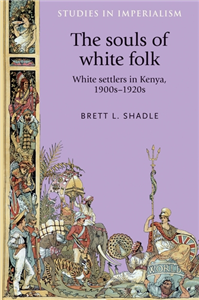Your Search Results
-
emons Verlag
The Cologne-based publishing house Emons was founded by Hermann-Josef Emons in 1984. We now have over 80 regional crime series, taking place in every part of Germany and since 2009 Emons crime novels also take place abroad (Austria, Switzerland, Spain, Italy etc.). Our books were published in over 13 countries, like Japan, Slowenia and Finland. Since 2009 we also publish our 111places (111 Orte) series. This illustrated guidebook series presents cities, regions and even whole countries from a wonderfully different and personal perspective.
View Rights Portal
-
Promoted ContentLiterature & Literary StudiesJune 2025
Saga emotions
by Gareth Lloyd Evans, Brynja Þorgeirsdóttir, Carolyne Larrington
Focusing particularly on historically oriented sagas, Saga emotions identifies and examines a range of emotions from across Old Norse-Icelandic saga literature. Each chapter begins with a discrete emotion term, such as reiði (anger), gleði (joy), or the peculiarly Old Norse víghugr (killing-mood), exploring its usages within the broad saga corpus, and focusing on its contextual meanings and narrative purposes. The contributions explore the specifics of the lexical terms used for different emotion states and offer in-depth case studies that consider how various emotions manifest within particular examples of saga literature. The book offers the emotional granularity lacking in current studies of Norse emotion and serves as an essential foundation for future research and study into emotional depiction in Old Norse-Icelandic saga literature.
-
Promoted Content
-
 Trusted Partner
Humanities & Social SciencesJanuary 2017
Trusted Partner
Humanities & Social SciencesJanuary 2017The souls of white folk
White settlers in Kenya, 1900s–1920s
by Brett Shadle, Andrew Thompson, John M. MacKenzie
Kenya's white settlers have been alternately celebrated and condemned, painted as romantic pioneers or hedonistic bed-hoppers or crude racists. The souls of white folk examines settlers not as caricatures, but as people inhabiting a unique historical moment. It takes seriously - though not uncritically - what settlers said, how they viewed themselves and their world. It argues that the settler soul was composed of a series of interlaced ideas: settlers equated civilisation with a (hard to define) whiteness; they were emotionally enriched through claims to paternalism and trusteeship over Africans; they felt themselves constantly threatened by Africans, by the state, and by the moral failures of other settlers; and they daily enacted their claims to supremacy through rituals of prestige, deference, humiliation and violence. The souls of white folk will appeal to those interested in the histories of Africa, colonialism, and race, and can be appreciated by scholars and students alike.
-
 Trusted Partner
October 2022
Trusted Partner
October 2022My Father's Secret
The BND, my family and I
by Corinna von Bassewitz
For a long time, Corinna von Bassewitz believed her father was a soldier, later on that he was a diplomat. Then, at the age of 16, she learnt something unbelievable: he had been a secret agent for the Bundesnachrichtendienst (BND, Germany's Federal Intelligence Service). Once the secret had been at least partly uncovered, she became something of a spy herself and eventually found some confidential documents in her parents' attic. Later, she realised that her father had been living as a double agent for the FRG and the GDR. So what effect does it have on a girl if her father conceals his true identity and eventually disappears without trace? Along with her family history, the author provides multi-layered and exciting insights into the historical context of the Cold War. A very personal book, intriguingly told and emotionally touching.
-
 Trusted Partner
Humanities & Social SciencesFebruary 2006
Trusted Partner
Humanities & Social SciencesFebruary 2006Women in Italy 1350–1650
Ideals and realities
by Mary Rogers, Paola Tinagli
This enlightening book aims to fill the gap in the literature on women's lives from the mid-fourteenth to the mid-seventeenth century, a time in which Italian urban societies saw much debate on the nature of women and on their roles, education and behaviour. Indeed these were debates which would in subsequent years resonate throughout Europe as a whole. Using a broad range of contemporary source material, most of which has never been translated before, this book illuminates the ideals and realities informing the lives of women within the context of civic and courtly culture. The text is divided into three sections: contemporary views on the nature of women, and ethical and aesthetic ideals seen as suitable to them; life cycles from birth to death, punctuated by the rites of passage of betrothal, marriage and widowhood; women's roles in the convent, the court, the workplace, and in cultural life. Through their exploration of these themes, Rogers and Tinagli demonstrate that there was no single 'Renaissance woman'. The realities of women¹s experiences were rich and various, and their voices speak of diverse possibilities for emotionally rich and socially useful lives. This will be essential reading for students and teachers of society and culture during the Italian Renaissance, as well as gender historians working on early modern Europe. ;
-
 Trusted Partner
November 2021
Trusted Partner
November 2021Femicide
Violence against women
by Julia Cruschwitz, Carolin Haentjes
In Germany, 132 women were murdered by their (ex-)partners over the past year, according to police statistics. An attempted murder happened every other day – the real figure is in all probability much higher. Julia Cruschwitz and Carolin Haentjes unveil their book on femicides in Germany with research from interviews with academics, criminologists, police officers, social workers, lawyers, survivors, witnesses and relatives and their analysis of scientific reports. Their work highlights how the issue of femicides affects the whole of society, but there are sensible ways to protect women more effectively from male violence. All we must do is take steps to follow these.













